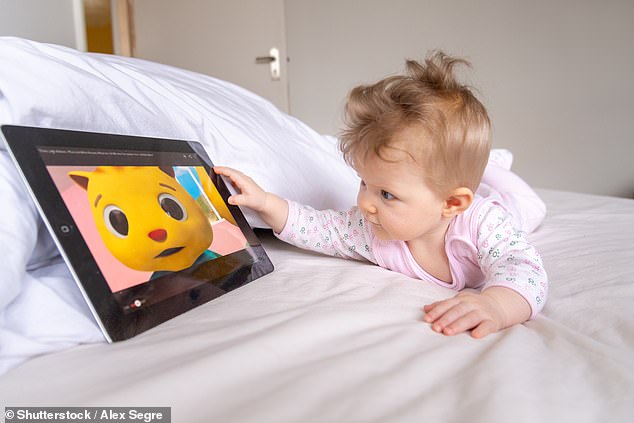The shocking rise in ADHD in our children can be linked to one thing. This is why it MUST be banned now: DR MAX PEMBERTON

Remember the pre-digital age – a time before tablets, smartphones and TV streaming services? It was only 25 or so years ago, but it feels like a lifetime.
Those who’ve known no other life must wonder how we all coped. Well, better than we do today, I’d argue.
There’s no doubt the online world has given us much, but it has also caused problems that we could never have foreseen.
One such issue is the way screens are used as ‘babysitters’, with stressed parents relying on them as a way of entertaining their children while they get on with the demands of everyday life – or just the chance for some peace and quiet.
It’s not unusual to see kids barely old enough to talk with an iPad in front of them, something grandparents are often horrified to witness.
While I don’t want to attack parents, many of whom are trying their best to get through the day, we must acknowledge the damage that is being done to future generations.
Last week, five leading French health organisations, including the French Society of Paediatrics, warned that the existing guidelines (no screen exposure before the age of three, and occasional use, limited to educational content and accompanied by an adult, between the ages of three and six) need to be updated.

Last week, five leading French health organisations said evidence shows that screens are not suitable for any child under six (that includes television) and that ‘they permanently impair their intellectual abilities’
They said evidence shows that screens are not suitable for any child under six (that includes television) and that ‘they permanently impair their intellectual abilities’.
Given that most parents would consider the original French recommendations to be extreme, I am not hopeful that many will take the drastic action being suggested, despite the warning of disaster if attitudes don’t change.
Those of us working in mental health services have shared the French medics’ concern for some time. We have seen endless youngsters with no ability to sit still and focus on anything for more than the time it takes to watch a TikTok video.
When they have constant access to screens that are over-stimulating their brains, bombarding them with quick-fire clips non-stop for hours on end, is it any wonder children now have record levels of ADHD and sleep problems?
I also worry that so many don’t seem to have any downtime. Everything has to be fast paced and frenetic, fed to them in bite-sized portions that require next to no concentration because they are always moving on to the next thing.
You only have to look at referrals to child mental health services, which are spiralling out of control, to realise how big a problem we are facing.
Studies have shown that under-fives are now, on average, glued to screens for more than four hours each day, missing out on the vital, real-world interaction that helps them to socialise and develop independence and language skills.
Last year it was revealed that more children than ever are starting school unable to communicate on even the most basic level.
Most parts of the country have recently experienced a run of glorious weather, yet I feel sure that if we surveyed what children were doing we would find that many of them spent the light spring evenings indoors playing video games, rather than outside kicking a ball around or throwing a frisbee with friends.
The painful reality for parents is that they must start limiting screen time if they don’t want their children to suffer further down the line.
Yes, there will be pushbacks and tantrums but it’s the only way that children will learn to experience and tolerate boredom. They will thank you in years to come.
A friend of mine who is a surgeon at Great Ormond Street Hospital says we should view things like the iPad in the same way we do sweets.
Of course, children want more than is good for them but it is a parent’s job to put their foot down and say ‘No. You have had enough.’
Harry’s bittersweet words
I am pleased that Prince Harry has said he wants to reconcile with his family, the only problem is I’m not convinced he has any idea of the process involved or the sacrifices he must make to achieve this.
In his bombshell BBC interview, he claimed that his father won’t speak to him because of his court battle over his security.

In Prince Harry’s bombshell BBC interview, the royal claimed that his father won’t speak to him because of his court battle over his security
If this is the case, then why would Harry appeal the original High Court decision if it was going to be a stumbling block in rebuilding a relationship with his father? It makes his claims sound rather hollow.
He comes across as self-righteous and aggrieved, rather than truly sorry for the upset he has caused his family.
The King, of course, has every right to cut off contact with the son who’s so publicly attacked him and his wife Camilla.
What it will really take to make amends is for Harry to cease his endless whinging and apologise unequivocally for the pain he’s caused.
Yes, I’m sure there is blame on both sides – there usually is – but family rifts can never be mended without a degree of humility from all concerned. And – most crucially of all – both parties have to genuinely want it, otherwise things will quickly fall apart again.
In a bid to cut waiting times, the Society of Radiographers has suggested allowing men to perform mammograms.
There has been a backlash but a kind, gentle and helpful clinician (male or female) is what patients want.
Sore eyes, a runny nose an itchy throat – for many people spring and early summer has them reaching for the antihistamines.
However, pharmacists last week raised concerns about the use of antihistamines that can cause drowsiness as they interfere with acetylcholine – a natural chemical in the brain – which plays a key role in cognitive function.
Recently these medications have been used a lot in place of traditional sleeping tablets and anti-anxiety medications which can be addictive.
This is why I wish the NHS would offer more effective sleep psychology courses.
In my area, patients can self-refer for a CBT sleep service, which has been proven to cure 80 to 90 per cent of insomnia cases.
Dr Max prescribes… Stop gambling App

Gambling, like many other addictions, plays on the reward pathways in our brains, which release dopamine when they are stimulated.
Yet a quarter of those with gambling problems do not seek support or help due to feelings of shame or embarrassment.
GambleAware has recently launched an app, which helps people reduce gambling or quit altogether. Gambleaware.org




